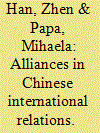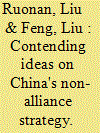|
|
|
Sort Order |
|
|
|
Items / Page
|
|
|
|
|
|
|
| Srl | Item |
| 1 |
ID:
179948


|
|
|
|
|
| Summary/Abstract |
What are Chinese views of international security alliances? Some scholars argue that the idea of alliance formation has become obsolete in contemporary international relations (IR), while others predict that China will eventually return to alliance formation, as major power competition intensifies. This study analyzes 1,403 articles addressing China’s foreign relationships published in the top five Chinese IR/political science journals between 1990 and 2019. We use automatic content analysis to identify key concepts and measure trends in Chinese alliance thinking. Our findings challenge the view that alliances are obsolete in contemporary Chinese IR. Alliance debates have increased in prominence during Xi’s administration. Since the 1990s, however, the partnership concept has emerged as an alternative to the alliance concept. We examine the application of these concepts through cases of China’s relations with the United States, Russia, and India.
|
|
|
|
|
|
|
|
|
|
|
|
|
|
|
|
| 2 |
ID:
153026


|
|
|
|
|
| Summary/Abstract |
As China’s rise continues to shape its role in international affairs, Chinese international relations scholars are engaging in a lively debate about the country’s grand strategy, particularly surrounding whether or not China should abandon the non-alliance strategy it has adopted since the early 1980s. Some scholars contend that a non-alliance strategy cannot safeguard China’s national interests in the face of the United States’ security alliance network throughout East Asia, and that without allies China’s rise will be contained by the US. Pro-alliance scholars, therefore, are especially favourable towards a formal alliance with Russia. However, orthodox scholars in favour of supporting the official position of non-alliance argue that a formal alliance deviates from the fundamental principles of independence and self-reliance that have historically guided China’s foreign policy. Moreover, a number of alternative strategies have been proposed to replace or complement the non-alliance strategy, among which are quasi-alliances, coalitions, and strategic partnerships. In practice, whether or not China forms alliances with other powers and neighbouring states depends on its self-defined role within the current international system, as well as its perception of external security threats. Considering both the external and internal constraints it faces, China is highly likely to maintain the non-alliance stance while pursuing other desirable approaches to making friends and partners.
|
|
|
|
|
|
|
|
|
|
|
|
|
|
|
|
| 3 |
ID:
142867


|
|
|
|
|
| Summary/Abstract |
Scholars have been studying whether China’s call for “discourse power” in international politics (initially made in 2011) is simply a tactic in the country’s now-familiar pursuit of national interests as part of its ascendency. A closer look is required to avoid mistakenly considering it as no more than the Communist Party’s propaganda, which would miss the point regarding China’s use of the phrase in the context of prevailing normative worldviews regarding fairness and justice. The current Chinese international relations (IR) literature contains a significant number of articles on discourse power (huayuquan) that discuss how calls for protecting sovereignty and rights in international affairs represent a perceived cultural need on the part of the Chinese government to articulate its own worldview while promoting its national interests. The author argues that without identifying theoretical or conceptual rationales and processes that support China’s assertion of a need for discourse power in international affairs, it is possible to overlook the important cultural roots underlying the Chinese government’s repeated demands for legitimacy in its dealings with other nation-states.
|
|
|
|
|
|
|
|
|
|
|
|
|
|
|
|
| 4 |
ID:
153027


|
|
|
|
|
| Summary/Abstract |
‘International Responsibility’ has become one of the most significant topics in Chinese International Relations studies over the last decade. Although growing numbers of scholars have focused on this issue, there remains a low awareness of the need to explore its roots in China’s academia, and to investigate the internal debates that display the different Chinese perceptions of international responsibility. This article provides a discourse-activation framework to explain why Robert B. Zoellick’s speech polarized China’s attention on international responsibility. It moreover constructs a typological framework based on dimensions that include the nationalism–internationalism orientation and degree of fulfilling international responsibility. It singles out three camps of scholars and their respective viewpoints on international responsibility and China’s relevant policies in this regard, and demonstrates the ‘divergent convergence’ feature that characterizes the debate on the topic. In addition to this structural analysis, the article also summarizes the overall trend from 1950 to 2015 of the preventative to projecting preferences apparent in China’s academic studies and political discourses on international responsibility. Subsequently, the article briefly investigates the possible factors affecting convergence and divergence of perceptions of international responsibility, which imply that fulfilling international responsibility is crucial to China’s growing presence on the global stage, and that Chinese academics’ attention to international responsibility should focus on collaboration towards improving the effectiveness of China’s assertive behaviour in international affairs.
|
|
|
|
|
|
|
|
|
|
|
|
|
|
|
|
| 5 |
ID:
125776


|
|
|
|
|
| Publication |
2013.
|
| Summary/Abstract |
Food is a tireless referent in international relations studies about China and its ties with the rest of the world. This paper addresses two contemporary issues. First, why is China so sensitive about grain self-sufficiency? Second, why does there seem to be a lack of effective dialogue between epistemic communities in China and outside over China's overseas agricultural activities? The first part of the paper reviews the development of China's agricultural sector and underlines the importance of China's contribution in stabilizing the world food markets. Next, it explores the ideational sources of Chinese food insecurity, in spite of its success in attaining high levels of self-sufficiency in grain. The third part of the paper reviews the evolution of China's overseas agricultural activities and analyzes the factors that contribute to a mismatch of understanding about the political implications therein. The paper concludes by proposing a couple of conceptual road maps for securitizing food as a referent in debates about China's security environment and Chinese international relations.
|
|
|
|
|
|
|
|
|
|
|
|
|
|
|
|
| 6 |
ID:
114902


|
|
|
|
|
| Publication |
2012.
|
| Summary/Abstract |
Dr. Zhou Fangyin's 'Equilibrium Analysis of the Tributary System' enriches
the increasingly salient debate among Chinese International Relations (IR)
students on the so-called 'tributary system'
1
in three ways. First, it correctly
points out that China did not unilaterally create the mode of interstate
connections in pre-modern East Asia. Rather, the 'system', if there was
indeed such a thing, was an institutional mechanism mutually constructed
by both the central and peripheral regimes. This, in my opinion, is a crucial
clarification that revises the views of some of the Fairbankian School of
scholars, who insist that the tributary system was an institution enforced
by China on surrounding states that only passively accepted it.
2
Second, the
article differentiates between tributary discourse and practice, and emphasizes the system's internal logic in practical policy making. In another words,
by observing the tributary system as policy-oriented behaviour, the article
rejects the explanation of it as a (partially self-deceived) cultural phenomenon, instead emphasizing its realist significance as a rational political
arrangement. In so doing, it opens the way to further research on the
topic along the political science line.
|
|
|
|
|
|
|
|
|
|
|
|
|
|
|
|
|
|
|
|
|